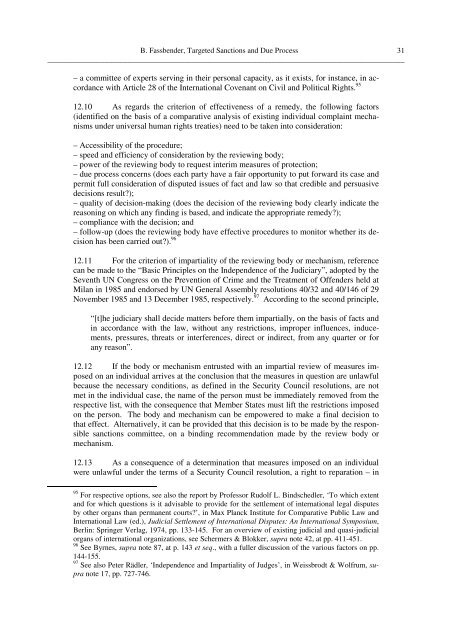Targeted Sanctions and Due Process - United Nations Treaty ...
Targeted Sanctions and Due Process - United Nations Treaty ...
Targeted Sanctions and Due Process - United Nations Treaty ...
Create successful ePaper yourself
Turn your PDF publications into a flip-book with our unique Google optimized e-Paper software.
B. Fassbender, <strong>Targeted</strong> <strong>Sanctions</strong> <strong>and</strong> <strong>Due</strong> <strong>Process</strong><br />
31<br />
______________________________________________________________________________________________<br />
– a committee of experts serving in their personal capacity, as it exists, for instance, in accordance<br />
with Article 28 of the International Covenant on Civil <strong>and</strong> Political Rights. 95<br />
12.10 As regards the criterion of effectiveness of a remedy, the following factors<br />
(identified on the basis of a comparative analysis of existing individual complaint mechanisms<br />
under universal human rights treaties) need to be taken into consideration:<br />
– Accessibility of the procedure;<br />
– speed <strong>and</strong> efficiency of consideration by the reviewing body;<br />
– power of the reviewing body to request interim measures of protection;<br />
– due process concerns (does each party have a fair opportunity to put forward its case <strong>and</strong><br />
permit full consideration of disputed issues of fact <strong>and</strong> law so that credible <strong>and</strong> persuasive<br />
decisions result?);<br />
– quality of decision-making (does the decision of the reviewing body clearly indicate the<br />
reasoning on which any finding is based, <strong>and</strong> indicate the appropriate remedy?);<br />
– compliance with the decision; <strong>and</strong><br />
– follow-up (does the reviewing body have effective procedures to monitor whether its decision<br />
has been carried out?). 96<br />
12.11 For the criterion of impartiality of the reviewing body or mechanism, reference<br />
can be made to the “Basic Principles on the Independence of the Judiciary”, adopted by the<br />
Seventh UN Congress on the Prevention of Crime <strong>and</strong> the Treatment of Offenders held at<br />
Milan in 1985 <strong>and</strong> endorsed by UN General Assembly resolutions 40/32 <strong>and</strong> 40/146 of 29<br />
November 1985 <strong>and</strong> 13 December 1985, respectively. 97 According to the second principle,<br />
“[t]he judiciary shall decide matters before them impartially, on the basis of facts <strong>and</strong><br />
in accordance with the law, without any restrictions, improper influences, inducements,<br />
pressures, threats or interferences, direct or indirect, from any quarter or for<br />
any reason”.<br />
12.12 If the body or mechanism entrusted with an impartial review of measures imposed<br />
on an individual arrives at the conclusion that the measures in question are unlawful<br />
because the necessary conditions, as defined in the Security Council resolutions, are not<br />
met in the individual case, the name of the person must be immediately removed from the<br />
respective list, with the consequence that Member States must lift the restrictions imposed<br />
on the person. The body <strong>and</strong> mechanism can be empowered to make a final decision to<br />
that effect. Alternatively, it can be provided that this decision is to be made by the responsible<br />
sanctions committee, on a binding recommendation made by the review body or<br />
mechanism.<br />
12.13 As a consequence of a determination that measures imposed on an individual<br />
were unlawful under the terms of a Security Council resolution, a right to reparation – in<br />
95 For respective options, see also the report by Professor Rudolf L. Bindschedler, ‘To which extent<br />
<strong>and</strong> for which questions is it advisable to provide for the settlement of international legal disputes<br />
by other organs than permanent courts?’, in Max Planck Institute for Comparative Public Law <strong>and</strong><br />
International Law (ed.), Judicial Settlement of International Disputes: An International Symposium,<br />
Berlin: Springer Verlag, 1974, pp. 133-145. For an overview of existing judicial <strong>and</strong> quasi-judicial<br />
organs of international organizations, see Schermers & Blokker, supra note 42, at pp. 411-451.<br />
96 See Byrnes, supra note 87, at p. 143 et seq., with a fuller discussion of the various factors on pp.<br />
144-155.<br />
97 See also Peter Rädler, ‘Independence <strong>and</strong> Impartiality of Judges’, in Weissbrodt & Wolfrum, supra<br />
note 17, pp. 727-746.
















